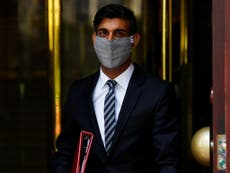Tier 2 lockdown: Rishi Sunak announces monthly grant scheme for affected businesses
Manchester mayor Andy Burnham ‘open-mouthed’ that support announced only after London entered local restrictions
Your support helps us to tell the story
From reproductive rights to climate change to Big Tech, The Independent is on the ground when the story is developing. Whether it's investigating the financials of Elon Musk's pro-Trump PAC or producing our latest documentary, 'The A Word', which shines a light on the American women fighting for reproductive rights, we know how important it is to parse out the facts from the messaging.
At such a critical moment in US history, we need reporters on the ground. Your donation allows us to keep sending journalists to speak to both sides of the story.
The Independent is trusted by Americans across the entire political spectrum. And unlike many other quality news outlets, we choose not to lock Americans out of our reporting and analysis with paywalls. We believe quality journalism should be available to everyone, paid for by those who can afford it.
Your support makes all the difference.Chancellor Rishi Sunak has announced a £2,100-a-month grant to hospitality, accommodation and leisure businesses as part of a £13bn package to help the economy of areas under tier 2 coronavirus restrictions.
But he was accused by Labour of coming to the aid of companies in localised lockdowns only after London entered tier 2.
Greater Manchester mayor Andy Burnham said he was “open-mouthed” to see the package after months in which his city - along with areas like Merseyside, the West Midlands, the northeast and parts of Yorkshire - was subjected to local restrictions.
The grants, backdated to August, will go to up to 150,000 businesses in England, including hotels, restaurants, B&Bs which are not legally required to close but have lost business because of localised restrictions. The backdating means that areas of the north and midlands subjected to local lockdowns over recent months will benefit.
Mr Sunak also doubled the value of upcoming grants for the self-employed from 20 per cent to 40 per cent of average profits, increasing their maximum value from £1,875 to £3,750.
And he reduced from 33 per cent to 5 per cent the minimum employer’s contribution to the wages of staff unable to work full-time, also cutting the minimum requirement from 33 per cent to 20 per cent of normal hours, so those working just one day a week will be eligible.
For someone being paid £587 for unworked hours, the government would be contributing £543 and their employer only £44.
The Treasury declined to put a precise figure on the total cost of the support, which will depend on how long restrictions last and the level of take-up.
But with the changes to the job support scheme expected to cost £1bn a month for every 200 million applicants, support for the self-employed increasing by £3.1bn and additional grants to businesses likely to cost around £200m a month, the total bill is thought likely to reach around £13bn if it runs for six months.
Mr Sunak said the action was being taken in response to “profound economic uncertainty” experienced by companies in the hospitality, leisure and accommodation sectors whose business has been hit but who have been unable to access support available to those in tier 3 who have been legally required to close.
He met with industry representatives ahead of his statement in a London restaurant which Treasury sources stressed was Covid-secure and not open for business.
In a message to all businesses in areas with regional restrictions, Mr Sunak said: “I understand your frustration, people need to know this is not forever. These are temporary restrictions to help control the spread of the virus.
"These are temporary restrictions to help control the spread of the virus.
“There are difficult days and weeks ahead, but we will get through this together. People are not on their own. We have an economic plan that will protect the jobs and livelihoods of the British people wherever they live and whatever their situation.”
But Labour’s shadow chancellor Anneliese Dodds told the Commons: “For months we have urged the Chancellor to get ahead of the looming unemployment crisis and act to save jobs.
“Instead, we’ve had a patchwork of poor ideas rushed out at the last minute.”
Ms Dodds asked how many jobs have been lost as a result of the chancellor’s “inaction” and pressed him to explain what has changed which means “this is the right thing to do now, but wasn’t when parts of the north and midlands” entered tier 2-style restrictions several weeks ago.
She said: “The chancellor has only caught up and listened to the anxieties of workers and businesses when it looks like these restrictions will be affecting London and the West Midlands.
“Will he apologise to those who have already lost their jobs, seen their businesses slip through their fingers in those areas which have not had that support until now?”
Mr Burnham said he could “barely believe” the chancellor’s announcement, which comes two days after talks on support for Greater Manchester collapsed over the government’s refusal to add £5m to its proposed package.
“Why on earth was this not put on the table on Tuesday to reach an agreement with us?” asked the mayor.
“I said directly to the PM that a deal was there to be done if it took into account the effects on Greater Manchester businesses of three months in tier 2.”




Join our commenting forum
Join thought-provoking conversations, follow other Independent readers and see their replies
Comments